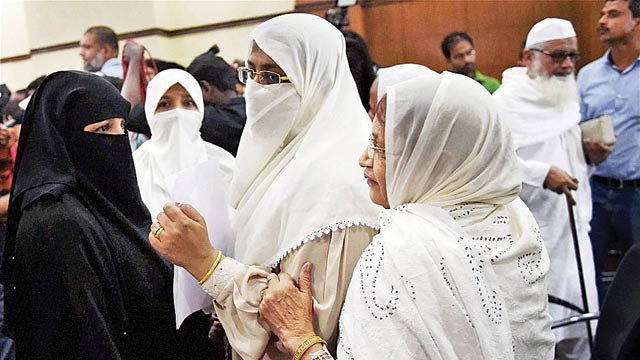New Delhi, (IANS) : The uniform civil code won’t help Muslim women as majority of them won’t approach a court if it’s violated, the founder of Women’s Jamaat Sharifa Khanum has said.
Khanum had started the Tamil Nadu Women’s Jamaat (Mosque). She feels that Muslim women don’t enjoy any Islamic rights or any constitutional rights in India, but bringing in the uniform civil code won’t have an impact.
“It is okay to bring in the Uniform Civil Code (to replace the personal laws based on the scriptures and customs of each major religious community) but 90 per cent women won’t go to the court as the debates will end in families and not go beyond,” Khanum said.
She was speaking at a session on “Right To Pray: Are Women Children Of A Lesser God?” that was organised at India Today Woman Summit here on Friday.
“When we were trying to build the women’s mosque. The major things stopping us, for our women workers, were character assassination and physical abuse,” she said.
Khanum pointed out that in the past 20 years, more than 100 girls have been killed in the name of suicide.
“I’ve been working for Muslim women all these years. The Muslim Personal Law Board does not support us. Muslim women are getting talaq for no reason. Quran does not say that, the personal law does not say that,” she said.
She also went in-depth about her own subjugation experience as a teenager.
“When I was 15, I was not given the permission to even stand outside my house. I got beaten up by my own brother for not believing in religion or god. But I’m not bothered about any of that,” Khanum said.
“I was labelled ‘characterless’ and ‘anti-religious’ by the people around me. I feel that we women are discriminated in the name of religion. We need space and power for Muslim women,” Khanum added.
Civil Rights Activist Trupti Desai was also a participant at the discussion.
“In 1950, women were given equal rights by the Indian constitution. But that’s not applicable in reality. We are just raising the obvious question when all men and women are born out of a woman, how can she be impure,” Desai questioned.
“When I tried to enter the Shani Shingnapur temple for the second time, people said I was going to go through a divorce and be thrown out of the house for doing so. We were blackmailed, detained by the police, but nothing could stop us,” she said.
Asked how she explains things to her seven-year-old son, Desai said: “I never needed to explain anything to him. He saw me on television being thrashed by the police. He told me to not come home and stay with those women for their protection.
She said that the little kid understood things much better than adults. “My son said — ‘I have girls with me in my class. They are everywhere. Why shouldn’t they be allowed to enter worship places?'”
“Every worship place should have equality. If the government passes such a rule, ‘sab ke liye acche din aa sakte hain’ (there can be good days for everyone),” Desai asserted.
Both had suggestions to make about resolving the Babri Masjid issue.
Desai said: “No matter what they build — mandir, masjid, dargah…women should walk hand-in-hand with men into it.”
For Khanum, it was more important to build education centres. “I would rather build an education centre instead of Babri Masjib as education is very important for every religion.”

